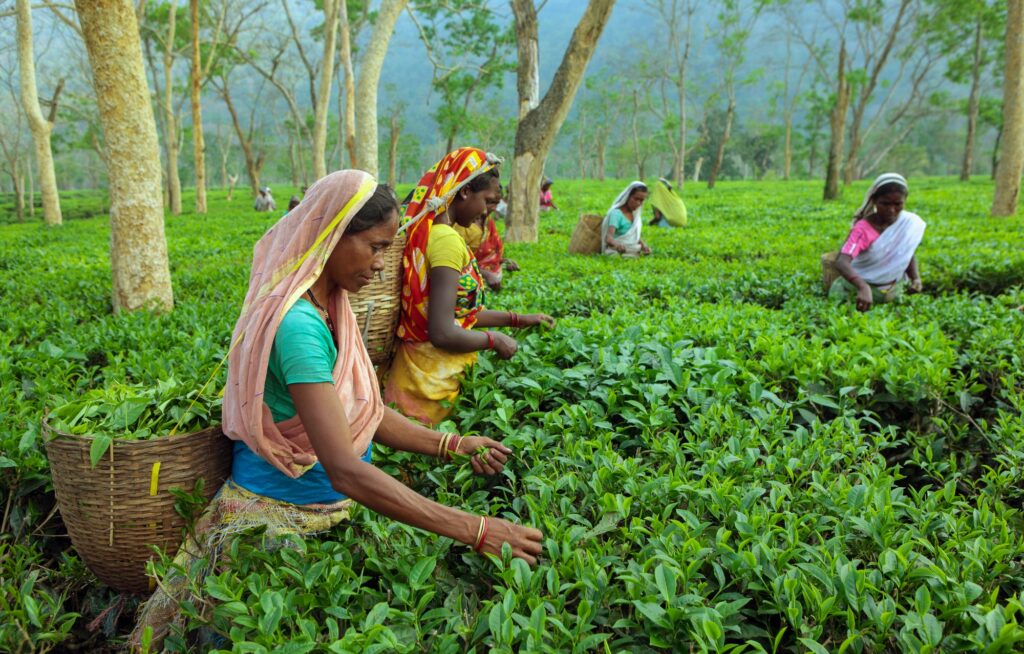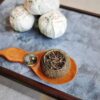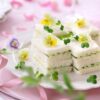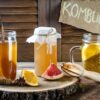
Welcome to the enchanting world of Assam tea, where boldness and robustness intertwine to create a flavorful experience like no other. Known as India’s finest brew, Assam tea takes you on a journey through the scenic landscapes of Assam, a region nestled in the foothills of the mighty Himalayas.
With its distinct malty flavor and bright burgundy hue, Assam tea captures the hearts of tea connoisseurs worldwide. This full-bodied tea is harvested from the Camellia sinensis var. assamica plant, which thrives in the rich and fertile soil of the region. Every sip of Assam tea is a symphony of bold flavors, leaving a lingering earthiness on your palate.
But Assam tea is more than just a beverage; it’s a cultural heritage that dates back centuries. Tea gardens dot the landscape of Assam, employing local communities and providing a livelihood deeply intertwined with tea cultivation. These lush gardens produce some of the world’s finest tea leaves, carefully handpicked and processed to preserve their natural essence.
Whether you prefer it black or with a splash of milk, Assam tea promises a delectable experience that lingers long after the last sip. Join us as we embark on a journey to discover the enchanting flavors and rich heritage of Assam tea.
The history and origin of Assam tea
Assam tea has a rich history that dates back centuries. It was in the early 19th century that the British East India Company discovered the indigenous tea plants in the Assam region. This discovery led to the establishment of the first tea gardens in the area, making Assam one of the oldest tea-growing regions in the world.
The unique climate and soil conditions of Assam create the perfect environment for tea cultivation. The region experiences heavy rainfall and high humidity, which contribute to the lush greenery and fertile soil. These natural conditions, coupled with the indigenous tea plant species, Camellia sinensis var. assamica, give Assam tea its distinct character and flavor.
Assam tea: Unique characteristics and flavor profile
What sets Assam tea apart from other varieties is its bold and malty flavor. The tea leaves from the Assam region produce a deep amber-colored liquor with a rich, robust taste. The strong and full-bodied nature of Assam tea makes it an ideal choice for those who prefer a hearty cup of tea.
The flavor profile of Assam tea is often described as bold, brisk, and with a hint of sweetness. It has a strong aroma and a distinct earthiness that lingers on the palate. Assam tea is also known for its ability to retain its flavor even when blended with other teas, making it a popular choice for breakfast blends.
Health benefits of Assam tea
In addition to its delightful taste, Assam tea offers a range of health benefits. Like other types of tea, Assam tea contains antioxidants that can help protect the body against free radicals and reduce the risk of chronic diseases. These antioxidants may also contribute to improved heart health and a strengthened immune system.
Assam tea is also known for its caffeine content, which can provide a natural energy boost and improve mental alertness. It has been found to enhance cognitive function, increase focus, and promote overall mental well-being.
Furthermore, Assam tea is packed with polyphenols, which are believed to have anti-inflammatory properties. These compounds may help reduce inflammation in the body and alleviate symptoms of various conditions, such as arthritis and digestive issues.
Assam tea production process
The production process of Assam tea is a meticulous and time-honored tradition. It begins with the careful cultivation of tea plants in the sprawling tea gardens of Assam. The plants are grown from seeds or cuttings and require constant care and attention to ensure optimal growth.
Once the tea leaves are ready for harvest, skilled workers handpick them from the bushes. This manual plucking method ensures that only the finest leaves, known as the “two leaves and a bud,” are selected. The plucked leaves are then taken to the processing units, where they undergo a series of steps to transform them into the flavorful tea we know and love.
The first step in the processing is withering, where the leaves are spread out on large trays or racks to remove excess moisture. This process helps prepare the leaves for the next stage, which is rolling. Rolling involves gently crushing the leaves to release the natural juices and oils, which contribute to the tea’s flavor and aroma.
After rolling, the leaves are left to oxidize. This oxidation process is what gives Assam tea its signature malty flavor and deep color. The length of oxidation can vary depending on the desired taste and strength of the tea.
Once the leaves have undergone the necessary oxidation, they are dried to stop the oxidation process. This step helps preserve the flavor and aroma of the tea. The dried leaves are then sorted according to size and quality, with the finest leaves being selected for higher-grade teas.
Popular varieties and grades of Assam tea
Assam tea comes in a variety of grades, each with its own unique characteristics and flavors. The grading system is based on the size and quality of the tea leaves. The most common grades of Assam tea include:
- Tippy Golden Flowery Orange Pekoe (TGFOP): This grade consists of whole leaves with golden tips, offering a well-rounded and flavorful cup of tea.
- Broken Orange Pekoe (BOP): This grade contains broken leaves and offers a strong and robust brew with a rich color.
- Fannings: These are small broken tea leaves that infuse quickly, making them ideal for tea bags and quick brewing.
- Dust: This grade consists of finely ground tea leaves and is commonly used in tea bags and instant tea mixes.
Each grade of Assam tea offers a unique taste and experience, allowing tea lovers to choose the one that best suits their preferences.
Brewing the perfect cup of Assam tea
Brewing Assam tea requires attention to detail to ensure that you get the best possible flavor and aroma. Here’s a step-by-step guide to brewing the perfect cup of Assam tea:
- Start by boiling fresh water. The quality of the water can greatly impact the taste of the tea, so it’s important to use filtered or spring water for the best results.
- Preheat your teapot or cup by rinsing it with hot water. This helps maintain the temperature of the tea during brewing.
- Measure the desired amount of Assam tea leaves. As a general guideline, use one teaspoon of tea leaves per cup of water.
- Place the tea leaves in a tea infuser or directly into the teapot. If using a teapot, pour the hot water over the tea leaves.
- Let the tea steep for 3-5 minutes, depending on your preference for strength. Be careful not to oversteep, as it can result in a bitter taste.
- Once the desired steeping time is reached, remove the tea leaves or infuser from the teapot. You can also transfer the tea to a separate cup or use a strainer to catch any loose leaves.
- If desired, add a splash of milk or a sweetener like honey or sugar to enhance the flavor of the tea. Assam tea is known for its ability to complement milk, creating a smooth and creamy cup.
- Give the tea a gentle stir and enjoy the bold and robust flavors of Assam tea.
Exploring Assam tea culture and traditions
Assam tea is not just a beverage; it is deeply ingrained in the culture and traditions of the region. Tea gardens are an integral part of Assam’s landscape, employing thousands of local communities and providing them with a sustainable livelihood.
Tea garden workers, often referred to as “tea pluckers,” play a crucial role in the tea production process. They are skilled in handpicking the tea leaves, ensuring that only the finest leaves are selected. The work of tea pluckers is labor-intensive, requiring precision and expertise.
Tea gardens in Assam also serve as social and cultural hubs. They are often adorned with colorful flowers and surrounded by lush greenery, creating a serene and picturesque setting. The tea gardens host various cultural events and festivals, showcasing the vibrant traditions and heritage of the region.
Assam tea is deeply woven into the social fabric of the local communities. It is a common sight to see people gather around a steaming cup of tea, engaging in lively conversations and bonding over shared experiences. Tea stalls or “chai dhabas” are popular meeting places, where people come together to enjoy the warmth and comfort of a cup of Assam tea.
Assam tea: A sustainable and ethical choice
In recent years, there has been a growing emphasis on sustainable and ethical tea production. Assam tea is no exception, with many tea gardens adopting practices that prioritize environmental conservation and social responsibility.
Several tea gardens in Assam have received certifications such as Fairtrade and Rainforest Alliance, which ensure that the tea is produced in an environmentally and socially sustainable manner. These certifications guarantee fair wages for workers, protection of natural resources, and adherence to strict quality standards.
By choosing Assam tea, you are not only indulging in its exquisite flavors but also supporting sustainable and ethical tea production practices. It’s a conscious choice that makes a positive impact on the environment and the lives of the tea workers.
Indulge in the rich flavors of Assam tea
Assam tea is a delight for the senses, offering a bold and robust flavor that captivates tea lovers around the world. Its unique characteristics and rich cultural heritage make it a truly enchanting brew.
From its humble origins to the meticulously crafted production process, Assam tea embodies the essence of Assam’s natural beauty and tea traditions. Whether you prefer it black or with a splash of milk, Assam tea promises a delectable experience that lingers long after the last sip.
So, take a moment to savor the flavors of Assam tea, and let it transport you to the scenic landscapes and vibrant culture of Assam. Indulge in this exquisite brew and discover the enchanting world of Assam tea, where boldness and robustness intertwine to create an unforgettable tea experience.






